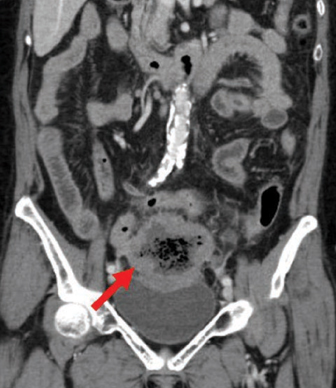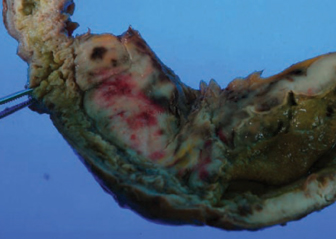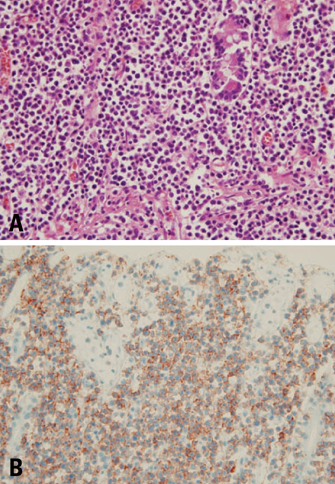Yonsei Med J.
2009 Dec;50(6):859-861. 10.3349/ymj.2009.50.6.859.
Case of Small Bowel Perforation due to Enteropathy-Type T-Cell Lymphoma
- Affiliations
-
- 1Department of Surgery, College of Medicine, Chung-Ang University, Seoul, Korea. ushinchoi@hotmail.com
- 2Department of Surgery, College of Medicine, Kyungpook National University, Daegu, Korea.
- KMID: 1777105
- DOI: http://doi.org/10.3349/ymj.2009.50.6.859
Abstract
- Enteropathy-type T-cell lymphoma (ETTL) is a rare disease with a poor prognosis. According to the World Health Organization (WHO) classification, it is a subtype of the peripheral T-cell lymphomas. This disease is associated with gluten-sensitive enteropathy, has a high risk of intestinal perforation and obstruction, and is refractory to chemotherapeutic treatment. We report the case of a 73-year-old woman who was diagnosed with enteropathy-type T-cell lymphoma of the small intestine, which was positive for the markers of cytotoxic T cells, CD3, CD8, and CD56, on immunohistochemical staining after resection of the perforated terminal ileum.
MeSH Terms
Figure
Cited by 1 articles
-
A Case of Natural Killer Like T Cell Lymphoma Misdiagnosed as Behcet's Enteritis of the Terminal Ileum
Yong Won Joo, Dong Hee Koh, Kang Nyeong Lee, Hang Lak Lee, Dae Won Jun, Byung Chul Yoon, Ho Soon Choi, Oh Young Lee
Korean J Gastroenterol. 2011;57(6):365-369. doi: 10.4166/kjg.2011.57.6.365.
Reference
-
1. Hönemann D, Prince HM, Hicks RJ, Seymour JF. Enteropathy-associated T-cell lymphoma without a prior diagnosis of coeliac disease: diagnostic dilemmas and management options. Ann Hematol. 2005. 84:118–121.2. Ruskoné-Fourmestraux A, Rambaud JC. Gastrointestinal lymphoma: prevention and treatment of early lesions. Best Pract Res Clin Gastroenterol. 2001. 15:337–354.
Article3. Al-Toma A, Verbeek WH, Hadithi M, von Blomberg BM, Mulder CJ. Survival in refractory coeliac disease and enteropathy-associated T-cell lymphoma: retrospective evaluation of single-centre experience. Gut. 2007. 56:1373–1378.
Article4. Brousse N, Meijer JW. Malignant complications of coeliac disease. Best Pract Res Clin Gastroenterol. 2005. 19:401–412.5. Ciclitira PJ, Moodie SJ. Transition of care between paediatric and adult gastroenterology. Coeliac disease. Best Pract Res Clin Gastroenterol. 2003. 17:181–195.6. Kataoka I, Arima F, Nishimoto J, Watanabe T, Kobayashi Y, Tamura R, et al. Enteropathy-type T-cell lymphoma showing repeated small bowel rupture and refractoriness to chemotherapy: a case report. Jpn J Clin Oncol. 2002. 32:546–549.
Article7. Novakovic BJ, Novakovic S, Frkovic-Grazio S. A single-center report on clinical features and treatment response in patients with intestinal T cell non-Hodgkin's lymphomas. Oncol Rep. 2006. 16:191–195.
Article
- Full Text Links
- Actions
-
Cited
- CITED
-
- Close
- Share
- Similar articles
-
- A case of enteropathy-type intestinal T-cell lymphoma, confused with celiac disease
- A Case of Enteropathy-Type T-Cell Lymphoma Diagnosed by Small Bowel Enteroscopy: A Perspective on Imaging-Enhanced Endoscopy
- Spontaneous Perforation of Small Bowel Lymphoma Causing Massive Pneumoperitoneum: A case Report
- A Case of Enteropathy-Associated T-cell Lymphoma (EATL) Presenting Perforation after Chemotherapy for Primary Intestinal Lymphoma
- A Case of Peripheral T-cell Lymphoma Presenting with Small Bowel Perforation




